You’ve probably heard claims about “leaky gut syndrome” causing everything from bloating to brain fog, but the reality is more complex than the marketing suggests. Online wellness companies sell expensive tests and treatments for this condition, while many doctors remain skeptical about its existence as a distinct medical diagnosis.

Leaky gut syndrome is not currently accepted as a formal medical diagnosis by mainstream medicine, though the underlying concept of increased intestinal permeability does exist in certain recognized conditions. The controversy stems from the gap between what science actually shows about gut barrier function and the broad health claims made in popular wellness circles.
Medical research indicates[1] that while intestinal permeability changes can occur in specific diseases like inflammatory bowel disease and irritable bowel syndrome, there are no validated tests to diagnose “leaky gut syndrome” itself. Understanding the difference between legitimate gut health concerns and unproven claims can help you make better decisions about your digestive health.
Key Takeaways
- Leaky gut syndrome lacks medical recognition as a formal diagnosis, though intestinal permeability changes occur in some established conditions
- No validated blood or stool tests can reliably diagnose leaky gut syndrome despite widespread marketing of such tests
- Evidence-based approaches to gut health focus on treating specific, recognized digestive disorders rather than the broad concept of leaky gut
What Is Leaky Gut Syndrome?
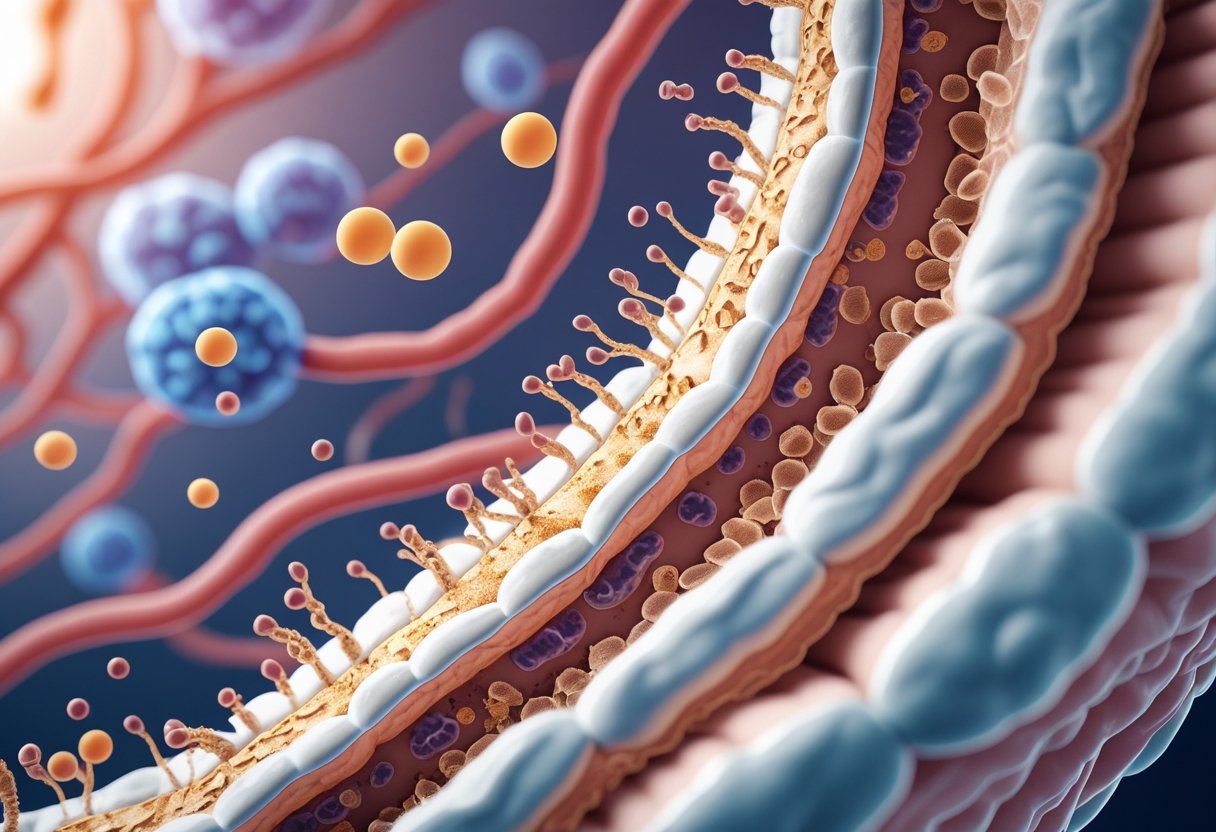
Leaky gut syndrome is not currently recognized as a medical diagnosis[2], though it’s based on the real concept of increased intestinal permeability. The condition involves changes to tight junctions in the gut barrier, which normally work together with other parts of the digestive system to control what passes through the intestinal wall.
Defining Leaky Gut and Intestinal Permeability
Leaky gut syndrome refers to a theoretical condition where the intestinal wall becomes more permeable than normal. This means substances that should stay in the digestive tract may pass through the gut lining into the bloodstream.
Increased intestinal permeability is a real biological process[3] that occurs in certain gastrointestinal diseases. However, the syndrome itself lacks scientific validation as a distinct medical condition.
Key differences include:
- Intestinal permeability: A measurable biological function
- Leaky gut syndrome: An unproven collection of symptoms
The intestinal wall normally allows selective passage of nutrients, water, and electrolytes. When this selective barrier function changes, larger molecules or harmful substances might cross into the bloodstream.
All individuals have some baseline level of intestinal permeability[1] as part of normal digestive function. The gut barrier naturally responds to various biological factors throughout the day.
The Role of the Gut Barrier and Tight Junctions
The gut barrier consists of multiple protective layers that work together to control what enters the body. The intestinal mucosa forms the primary barrier between the digestive tract contents and internal circulation.
Tight junctions act as gatekeepers between intestinal cells. These protein structures include claudins, occludin, and zonula occludens scaffold proteins that form physical barriers.
Two main transport pathways exist:
- Paracellular route: Between cells, controlled by tight junctions
- Transcellular route: Through cells via specialized transport mechanisms
The paracellular pathway allows ions, water, and larger compounds to pass between epithelial cells[1]. Tight junctions regulate this process by restricting diffusion and selectively permitting certain substances.
The transcellular route handles sugars, amino acids, vitamins, and larger proteins through endocytosis and exocytosis. This pathway can also allow bacteria and bacterial components to cross the intestinal wall.
How the Digestive System Maintains Balance
The digestive system uses complex integrated pathways to maintain proper barrier function. Multiple factors influence how substances move across the intestinal epithelium throughout each day.
Factors that can affect intestinal permeability:
- Diet and exercise
- Infections and illness
- Medications and alcohol
- Physical and emotional stress
The gut-brain axis connects the digestive and nervous systems. This connection means that stress and other neurological factors can influence gut barrier function.
The intestinal wall represents the body’s largest surface area exposed to external substances. This makes proper barrier function essential for preventing harmful pathogens from entering circulation.
Normal intestinal physiology involves selectively permeable tight junctions that respond to various biological factors[1]. The system dynamically adjusts permeability based on current needs and environmental conditions.
The mucosa contains specialized immune cells that help identify and respond to potentially harmful substances. These cells work with the physical barrier to maintain digestive system balance.
Controversy: Is Leaky Gut Syndrome a Recognized Medical Condition?
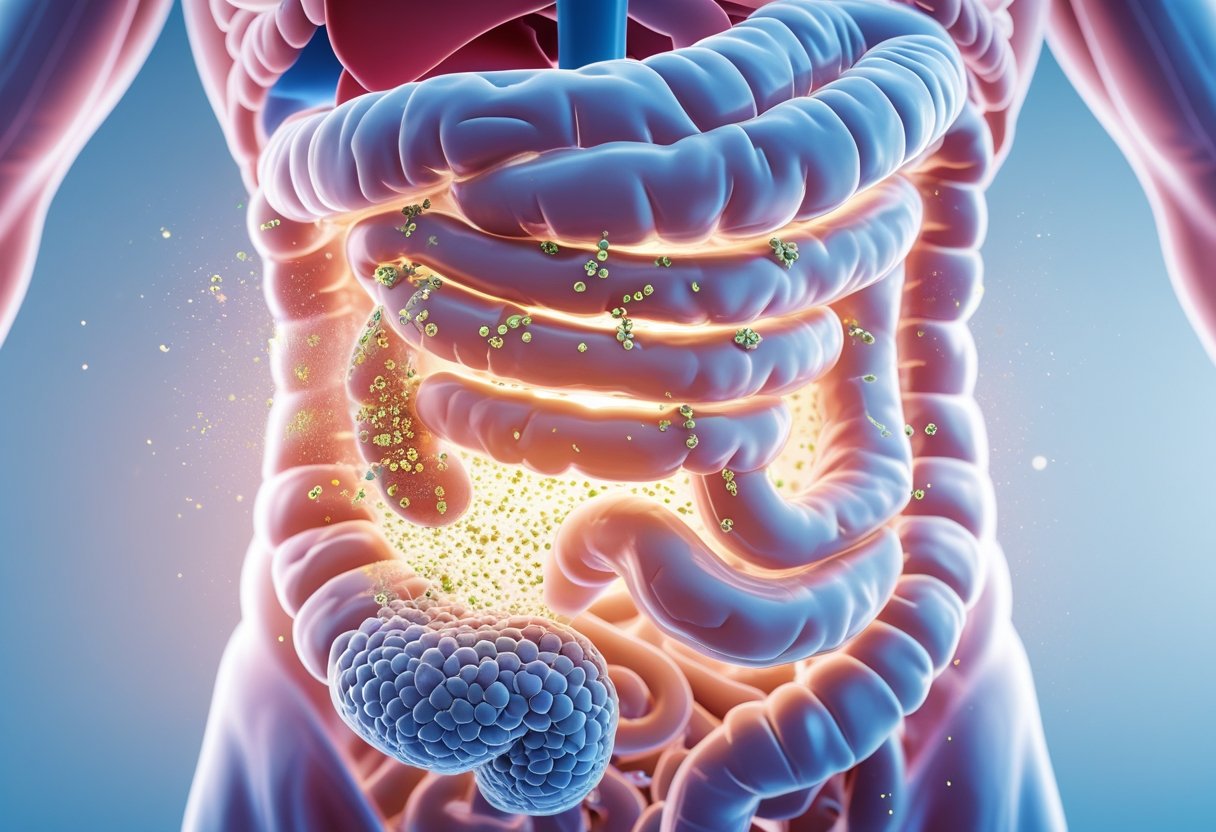
The medical community remains divided on whether leaky gut syndrome should be considered a legitimate diagnosis. Most doctors do not recognize it as a formal medical condition, while some alternative practitioners believe it causes widespread health problems.
Current Medical Consensus
Leaky gut syndrome is not a recognized medical diagnosis[4] among mainstream physicians. Most medical professionals maintain that it lacks sufficient scientific evidence to support its existence as a distinct condition.
The concept has gained popularity in alternative medicine circles. However, most physicians maintain that leaky gut syndrome is not a valid medical diagnosis[5].
Medical organizations do not include leaky gut syndrome in their diagnostic manuals. The condition is not currently accepted as a formal medical diagnosis[6] despite being widely discussed in popular health literature.
Key Issues with Recognition:
- No validated diagnostic tests exist
- Symptoms overlap with other conditions
- Limited peer-reviewed research
- Unclear treatment protocols
Arguments for and Against Recognition
Arguments Against Recognition:
Medical skeptics point to several concerns about leaky gut syndrome. No validated test currently exists to make this diagnosis[6], making it impossible to confirm the condition reliably.
The symptoms attributed to leaky gut syndrome are vague and common. Bloating, fatigue, and digestive issues can indicate many different gastrointestinal diseases or autoimmune disorders.
Critics worry about unnecessary testing and unproven treatments. Patients may spend money on expensive tests that provide no useful information.
Arguments for Recognition:
Some practitioners believe increased intestinal permeability plays a role in various health conditions. They argue that the gut barrier is a critical interface[7] that affects overall health.
Supporters point to research on intestinal permeability in autoimmune diseases. They suggest that a compromised gut lining may contribute to immune system problems.
Alternative medicine practitioners report success treating patients with leaky gut protocols. They believe conventional medicine has not caught up to emerging research.
Differences Between Leaky Gut and Other Gastrointestinal Diseases
Established Gastrointestinal Conditions:
Real gastrointestinal diseases have specific diagnostic criteria and proven treatments. Conditions like Crohn’s disease and ulcerative colitis show clear inflammation patterns on medical tests.
These diseases have measurable biomarkers in blood work or stool samples. Doctors can see physical changes in the intestinal lining during colonoscopy procedures.
Autoimmune Disorders vs. Leaky Gut:
Autoimmune diseases have documented immune system responses against the body’s own tissues. Blood tests can detect specific antibodies that confirm these conditions.
Leaky gut syndrome is a hypothetical condition[2] based on the concept of increased intestinal permeability. This differs from proven autoimmune disorders with clear diagnostic markers.
Diagnostic Differences:
| Established GI Diseases | Leaky Gut Syndrome |
|---|---|
| Specific diagnostic tests | No validated tests |
| Clear treatment guidelines | Unproven treatments |
| Medical recognition | Not recognized |
| Research-backed | Limited evidence |
The main difference lies in scientific evidence and medical validation. Recognized gastrointestinal diseases have extensive research supporting their existence and treatment approaches.
Scientific Explanations and Mechanisms
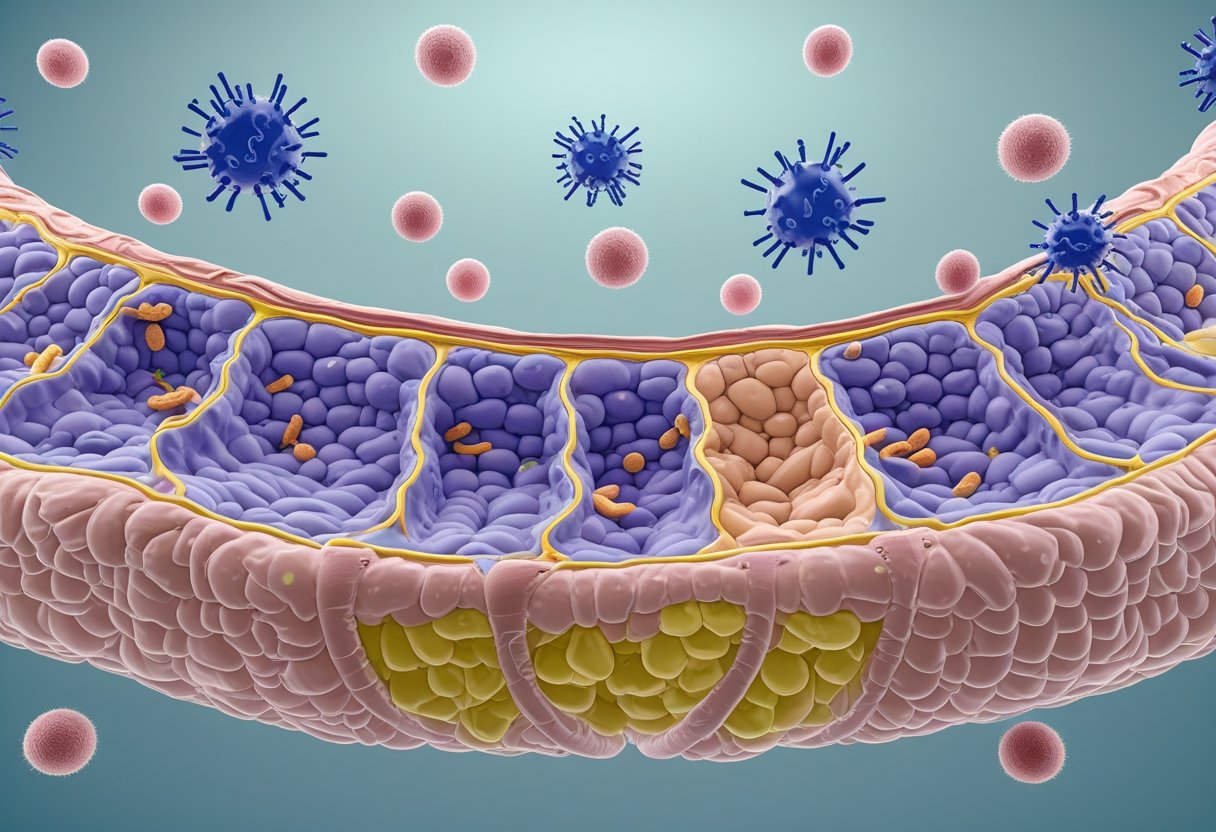
The intestinal barrier operates through multiple interconnected systems that control what passes from the gut into the bloodstream. These mechanisms involve specialized cell connections, protective mucus layers, and beneficial microorganisms that work together to maintain gut health.
The Function of Tight Junctions and Zonulin
Tight junctions act as gatekeepers between intestinal cells. These microscopic connections control which substances can pass through the intestinal wall.
The junctions form three distinct pathways for different sized molecules. The pore pathway allows small nutrients to pass through. The leak pathway permits slightly larger molecules. The unrestricted pathway only opens during tissue damage.
Zonulin proteins regulate how tight these junctions remain. When zonulin levels increase, the junctions become more permeable. This allows larger molecules to cross the intestinal barrier.
Research shows that zonulin affects barrier function[8] in various stress conditions. Factors like intense exercise, certain medications, and dietary irritants can trigger zonulin release.
The tight junction proteins include zonula occludens (ZO) and other specialized molecules. These proteins must maintain their structure to keep the barrier intact.
When tight junctions malfunction, unwanted substances may enter the bloodstream. This process involves actual physical changes in the cellular connections rather than mysterious “holes” in the gut wall.
The Role of the Mucus Layer and Mucin
The mucus layer provides the first line of defense in the intestinal barrier. This protective coating prevents harmful substances from directly contacting intestinal cells.
Mucin proteins form the backbone of this protective layer. MUC2 represents the most abundant mucin in both the small and large intestines. Goblet cells produce these proteins continuously.
The mucus exists in two distinct layers. The inner layer remains firmly attached to the intestinal surface and contains few bacteria. The outer layer stays loose and houses more bacterial populations.
The mucus composition affects gut bacteria populations[8] while bacteria influence mucus properties. This creates a dynamic relationship between the barrier and microorganisms.
Antimicrobial proteins mix with the mucus to enhance protection. These include immunoglobulin A (IgA), defensins, and lysozyme enzymes that neutralize potential threats.
Thickness varies throughout the digestive tract. The colon maintains a thicker mucus layer than the small intestine, sometimes reaching over 800 microns in depth.
How Beneficial Bacteria and Microorganisms Impact the Gut
Beneficial bacteria play active roles in maintaining intestinal barrier function. These microorganisms produce substances that strengthen tight junctions and support mucus production.
Bifidobacteria strains enhance barrier strength in laboratory studies. Certain E. coli strains like Nissle 1917 stimulate protective proteins in tight junctions.
Beneficial bacteria create short-chain fatty acids through fermentation. These compounds provide energy for intestinal cells and help maintain barrier integrity.
The microorganisms compete with harmful bacteria for space and nutrients. This competition prevents pathogenic species from establishing colonies and damaging the intestinal wall.
Some bacteria produce antimicrobial substances that inhibit dangerous microorganisms. This natural defense system works alongside the immune system to protect gut health.
Bacterial products can have opposite effects on permeability[8] depending on the specific strain. While some bacteria strengthen barriers, others may increase intestinal permeability.
The immune system responds differently to beneficial versus harmful bacteria. Healthy microorganisms help train immune cells to recognize actual threats while avoiding unnecessary inflammatory responses.
Potential Causes and Risk Factors

Several factors may contribute to increased intestinal permeability, ranging from dietary choices to medications and lifestyle factors. The etiology and pathophysiology of leaky gut syndrome are multifactorial[9], involving complex interactions between diet, stress, and various medical conditions.
Dietary Triggers: Sugar, Fat, Gluten, and Processed Foods
Certain foods may disrupt the intestinal barrier and increase gut permeability. High sugar intake can alter the gut microbiome balance and promote harmful bacteria growth.
Processed foods often contain additives and preservatives that may irritate the intestinal lining. These foods typically lack fiber and beneficial nutrients needed for gut health.
Common dietary triggers include:
- Refined sugars and artificial sweeteners
- Trans fats and excessive saturated fats
- Gluten-containing grains (wheat, barley, rye)
- Ultra-processed snacks and fast foods
Gluten sensitivity affects some individuals even without celiac disease. It can trigger inflammation in the small intestine.
Dairy products may cause issues for people with lactose intolerance or casein sensitivity. Some legumes contain lectins that might contribute to gut irritation in sensitive individuals.
Food sensitivities vary greatly between people. What triggers symptoms in one person may not affect another.
Effects of Medications like NSAIDs
Nonsteroidal anti-inflammatory drugs (NSAIDs) are among the most common medications that may increase intestinal permeability. These include ibuprofen, aspirin, and naproxen.
NSAIDs work by blocking enzymes that cause inflammation. However, they can also reduce protective prostaglandins in the gut lining.
Regular NSAID use may:
- Weaken the intestinal barrier
- Reduce protective mucus production
- Increase inflammation in the gut wall
- Allow toxins to pass through more easily
Long-term or high-dose NSAID use carries higher risks. Even short-term use can affect gut permeability in some people.
Certain medications may be relevant factors[9] in developing increased intestinal permeability. Other medications like antibiotics and proton pump inhibitors may also affect gut barrier function.
Impact of Chronic Stress and Inflammation
Chronic stress directly affects gut health through the gut-brain connection. Stress hormones like cortisol can weaken the intestinal barrier.
Stress impacts the gut by:
- Reducing blood flow to digestive organs
- Altering gut bacteria composition
- Increasing intestinal inflammation
- Disrupting normal digestive processes
Chronic inflammation creates a cycle where gut permeability worsens inflammatory conditions. This can lead to more widespread health issues.
Sleep deprivation and high stress levels both contribute to systemic inflammation. Mental stress can trigger physical changes in gut barrier function within hours.
Inflammatory conditions that may increase gut permeability include Crohn’s disease, ulcerative colitis, and irritable bowel syndrome. These conditions create ongoing inflammation in the digestive tract.
Other Contributing Factors
Several additional factors may contribute to increased intestinal permeability. Age naturally affects gut barrier function as people get older.
Zinc deficiency can impair gut barrier function since zinc is essential for maintaining tight junctions between intestinal cells. Many people don’t get enough zinc from their diets.
Environmental factors include:
- Excessive alcohol consumption
- Smoking and tobacco use
- Exposure to toxins and chemicals
- Poor sleep quality
Bacterial infections and imbalances in gut microbiome composition also play important roles. Some people may have genetic predispositions to gut barrier weakness.
A preceding gastrointestinal infection[9] can sometimes trigger ongoing gut permeability issues. The gut lining may remain compromised even after the infection clears.
Autoimmune conditions can both cause and result from increased gut permeability. This creates complex relationships between gut health and immune system function.
Symptoms and Health Associations
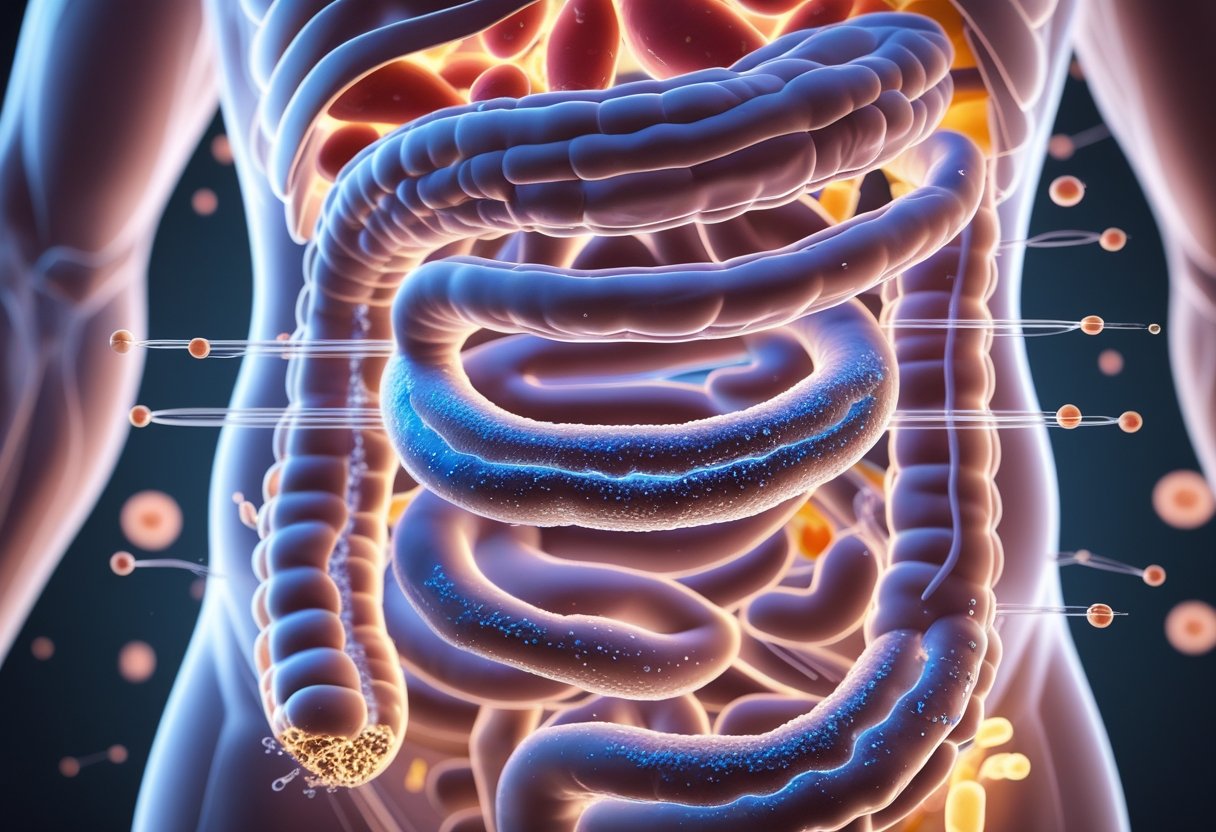
People who believe they have leaky gut syndrome report many different symptoms. Some affect digestion while others involve the whole body, and researchers are studying possible links to serious diseases.
Digestive Symptoms: Bloating, Gas, Constipation
The most common digestive problems people connect to leaky gut include uncomfortable stomach issues. Bloating makes the belly feel swollen and tight after eating.
Gas and burping happen more often than normal. Many people also deal with constipation or loose stools that change without warning.
Other digestive symptoms include:
- Stomach pain or cramping
- Nausea after meals
- Food not digesting well
- Feeling full too quickly
These symptoms are real and can make daily life hard. However, they can come from many different digestive problems, not just increased intestinal permeability.
Doctors usually look for specific conditions like irritable bowel syndrome or food allergies first. These have clear tests and proven treatments.
Systemic Manifestations: Fatigue, Skin Conditions, and More
Some people report symptoms throughout their whole body that they link to gut problems. Chronic fatigue is one of the most common complaints.
This tiredness does not improve with rest. People may feel drained even after sleeping well all night.
Skin conditions like eczema and acne are also frequently mentioned. The skin may become red, itchy, or break out more than usual.
Other whole-body symptoms include:
- Allergies that seem to get worse
- Mood changes and depression
- Joint pain and stiffness
- Brain fog and trouble focusing
- Headaches that happen often
Fibromyalgia symptoms like widespread muscle pain are sometimes connected to gut health. However, these connections are not proven by medical research yet.
Links to Chronic Diseases and Autoimmune Conditions
Research shows that increased intestinal permeability may connect to serious long-term diseases. Studies indicate leaky gut may be associated with autoimmune diseases[10] like lupus and multiple sclerosis.
Type 1 diabetes research shows changes in gut barrier function. The immune system attacks the body’s own cells in this condition.
Multiple sclerosis may also have gut connections. This disease affects the nervous system and causes muscle weakness.
Other diseases being studied include:
- Crohn’s disease and ulcerative colitis
- Chronic fatigue syndrome
- Certain types of cancer
- Heart disease
- Arthritis
Scientists know that conditions like Crohn’s disease definitely involve increased intestinal permeability. The gut lining becomes damaged and inflamed.
However, researchers have not proven that leaky gut causes these diseases. The gut changes might happen because of the disease, not before it.
More human studies are needed to understand these connections better.
Connection to Recognized Medical Conditions
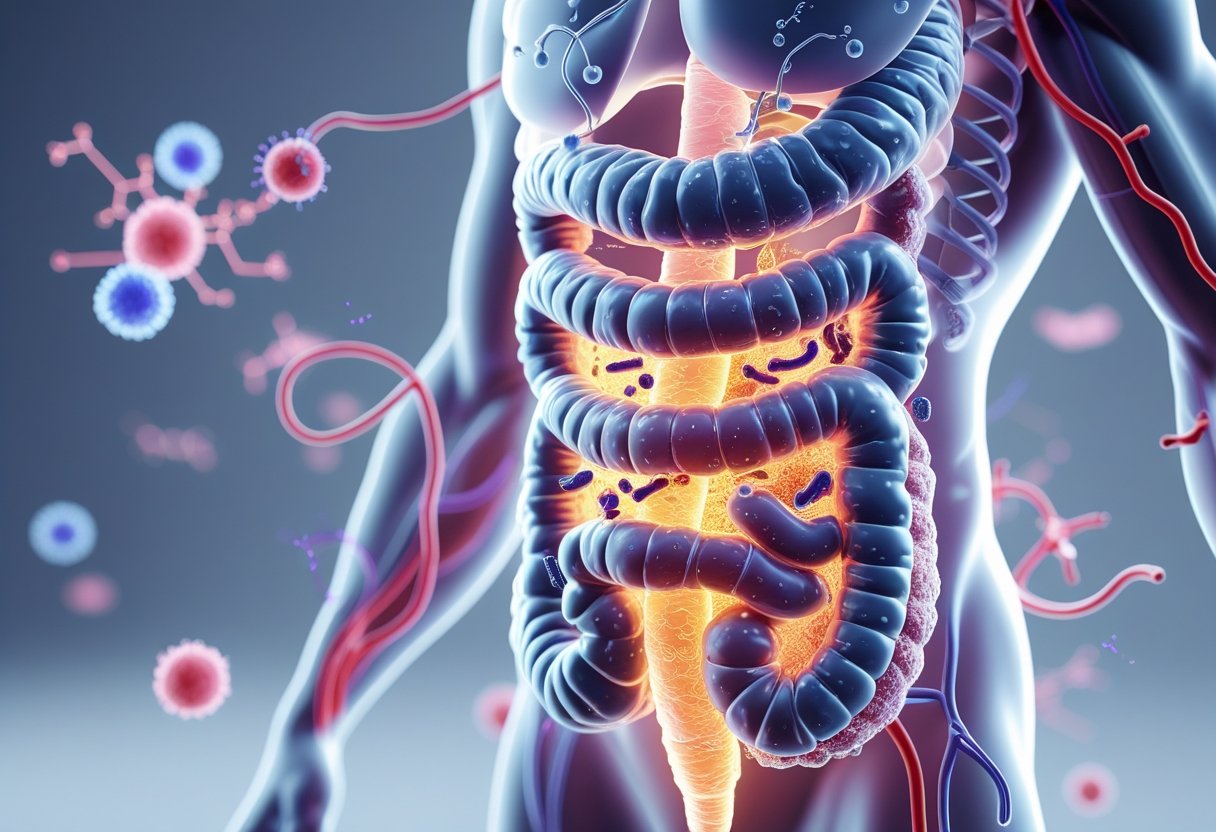
While leaky gut syndrome is not a recognized medical diagnosis[4], increased intestinal permeability does occur in several established medical conditions. These conditions show measurable changes in gut barrier function that doctors can diagnose and treat.
Celiac Disease and Gluten Sensitivity
Celiac disease causes clear damage to the intestinal lining when people eat gluten. The immune system attacks the small intestine, leading to inflammation and increased permeability.
Gluten triggers this autoimmune response in people with celiac disease. The protein damages tiny projections called villi that line the intestine. This damage allows substances to pass through the intestinal wall more easily.
Research shows that intestinal permeability improves in celiac patients who follow a strict gluten-free diet. The gut lining heals over time when gluten exposure stops.
Non-celiac gluten sensitivity may also affect gut barrier function. However, the research on this condition remains limited compared to celiac disease.
Inflammatory Bowel Disease: Crohn’s and Ulcerative Colitis
Crohn’s disease and ulcerative colitis both cause chronic inflammation in the digestive tract. This inflammation damages the protective barrier of the intestinal wall.
Studies show that people with inflammatory bowel disease have increased intestinal permeability. The inflammation disrupts tight junctions between intestinal cells.
Crohn’s disease can affect any part of the digestive tract. It creates deep inflammation that extends through intestinal wall layers.
Ulcerative colitis mainly affects the colon and rectum. The inflammation stays in the innermost layer of the intestinal lining.
Both conditions require medical treatment to reduce inflammation and protect gut barrier function. Doctors use various medications and sometimes surgery to manage these diseases.
Other Conditions Related to Increased Intestinal Permeability
Several other medical conditions show connections to altered gut barrier function. Fatty liver disease research suggests links between intestinal permeability and liver inflammation.
Some studies examine autism and gut permeability, though research remains limited and controversial[6]. The relationship between autism and intestinal function needs more investigation.
LPS (lipopolysaccharide) from certain bacteria can cross a compromised gut barrier. This may trigger inflammation in various body systems.
Certain medications, infections, and stress can also temporarily increase intestinal permeability. These factors may contribute to digestive symptoms in some people.
Gut Health: Management, Prevention, and Evidence-Based Approaches
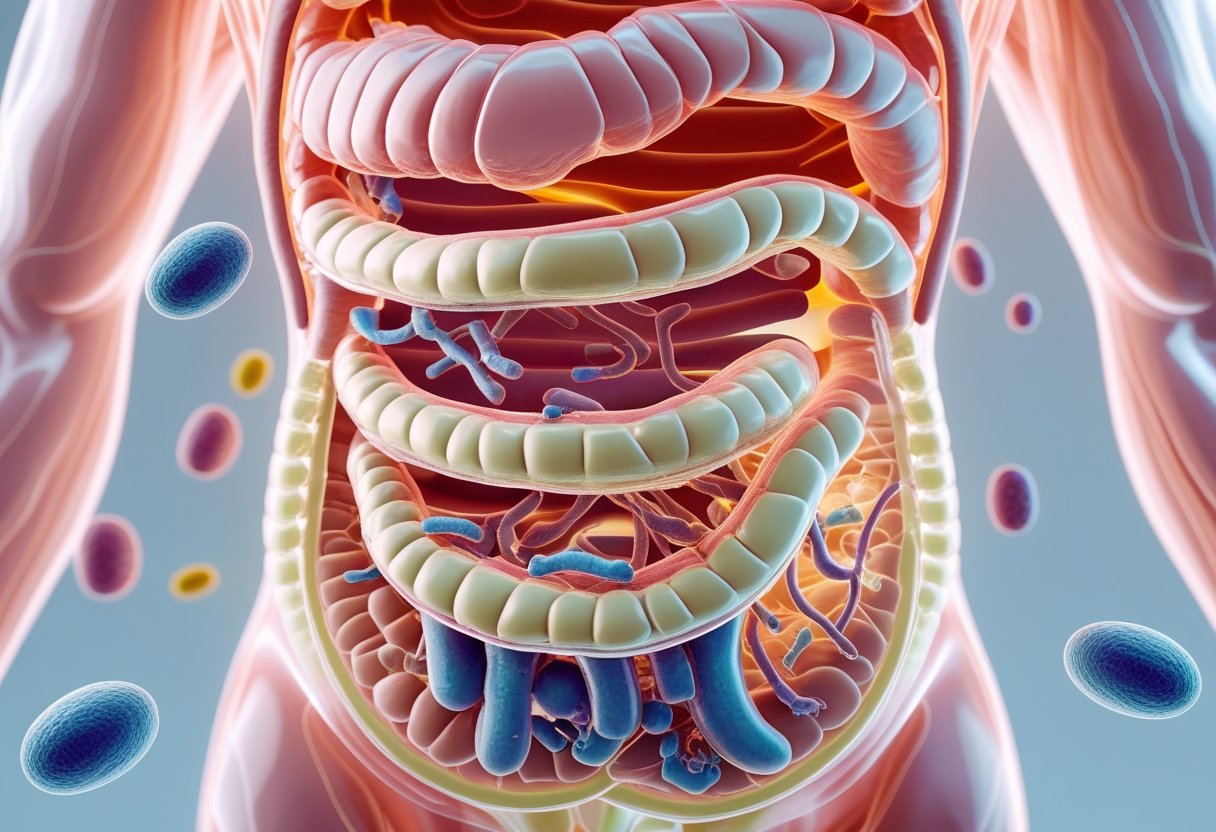
A healthy gut barrier requires specific nutrients, beneficial bacteria, and lifestyle practices that support natural intestinal function. Research shows that certain dietary approaches and probiotics can help maintain gut health, while many popular treatments lack scientific backing.
Supporting a Healthy Gut Barrier
The intestinal barrier depends on tight junctions between cells that control what passes through the gut wall. These structures need specific nutrients to function properly.
Key nutrients that support barrier function include:
- Glutamine (found in bone broth and protein-rich foods)
- Zinc (present in meat, seafood, and legumes)
- Vitamin D (from sunlight exposure and fatty fish)
- Omega-3 fatty acids (in salmon, walnuts, and flaxseeds)
Fiber plays a crucial role in gut health. It feeds beneficial bacteria that produce short-chain fatty acids. These compounds strengthen the intestinal lining and support immune response.
Lifestyle factors also matter. Regular sleep helps maintain the gut barrier. Chronic stress can weaken tight junctions between intestinal cells.
Exercise supports digestive health by improving blood flow to the intestines. However, intense training can temporarily increase intestinal permeability.
Avoiding unnecessary antibiotics protects the gut microbiome. When antibiotics are needed, taking them as prescribed helps prevent resistance.
The Role of Probiotics and Diet
Probiotics contain live beneficial bacteria that may support digestive health. However, evidence for their effectiveness remains limited[1] for treating leaky gut syndrome.
Research-backed probiotic strains include:
- Lactobacillus rhamnosus GG
- Bifidobacterium longum
- Saccharomyces boulardii
These strains have shown benefits in specific conditions like antibiotic-associated diarrhea and some digestive disorders.
A diverse diet supports a healthy gut microbiome better than supplements alone. Foods rich in prebiotics feed beneficial bacteria naturally.
Prebiotic foods include:
- Garlic and onions
- Bananas and apples
- Oats and barley
- Jerusalem artichokes
Fermented foods provide both probiotics and beneficial compounds. Yogurt, kefir, sauerkraut, and kimchi offer natural sources of helpful bacteria.
Digestive enzymes may help some people with specific enzyme deficiencies. However, healthy individuals typically produce adequate enzymes naturally.
Debunking Myths and Unproven Treatments
Many treatments marketed for leaky gut syndrome lack scientific evidence. Currently no validated test exists to diagnose leaky gut syndrome[1], making treatment claims questionable.
Unproven treatments to avoid include:
- Expensive supplement protocols without research backing
- Restrictive elimination diets not medically supervised
- Detox programs claiming to “heal” the gut lining
- Over-the-counter diagnostic tests for intestinal permeability
Some practitioners recommend avoiding all gluten or lectins. However, these restrictions are only necessary for people with specific medical conditions like celiac disease.
Blood tests claiming to diagnose leaky gut are methodologically flawed[1]. Zonulin levels and other marketed biomarkers do not reliably indicate gut health problems.
Evidence-based approaches focus on:
- Treating underlying digestive conditions
- Following balanced, varied diets
- Managing stress through proven methods
- Working with qualified healthcare providers
People experiencing persistent digestive symptoms should consult gastroenterologists rather than pursuing unvalidated treatments. Proper medical evaluation can identify treatable conditions that cause similar symptoms.
Frequently Asked Questions
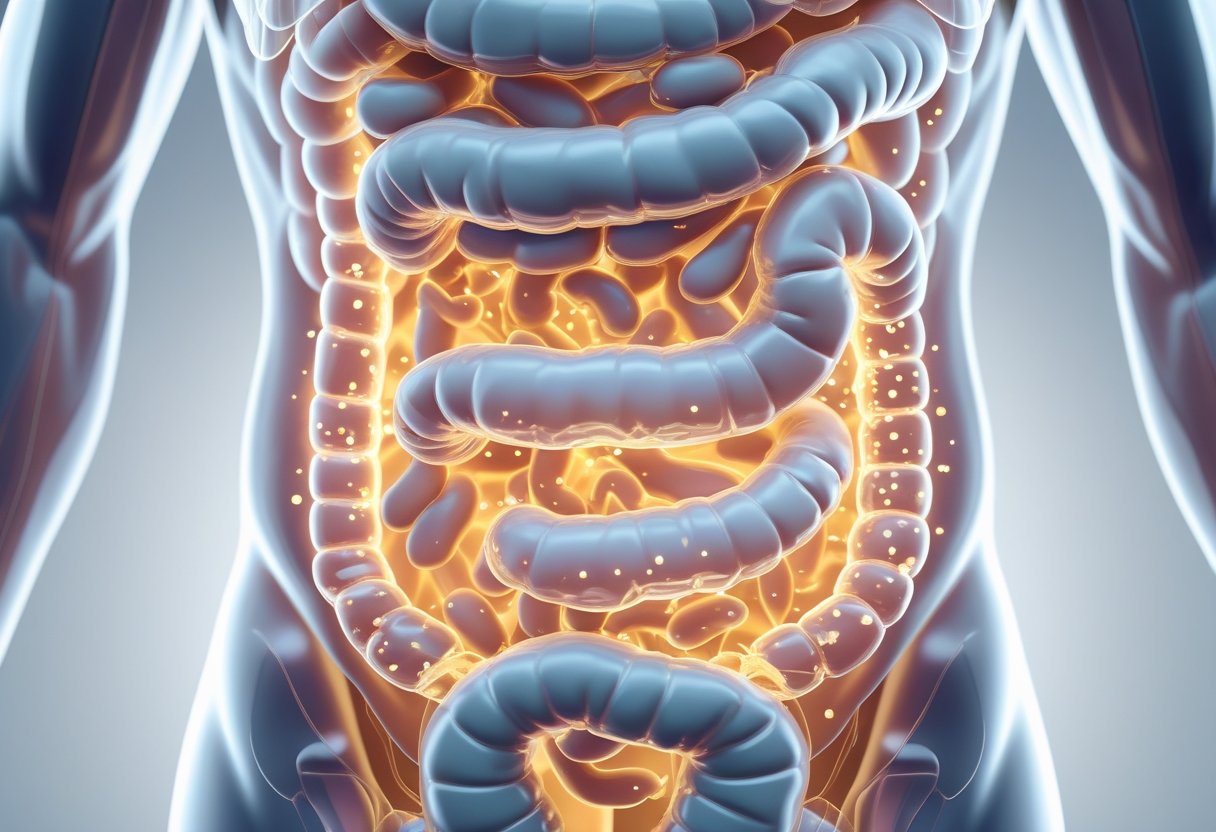
People often have questions about leaky gut syndrome symptoms, diagnosis methods, and treatment options. Medical professionals emphasize that leaky gut syndrome is not currently accepted as a formal medical diagnosis[6], though intestinal permeability changes do occur in certain conditions.
What are the common symptoms indicating the presence of leaky gut syndrome?
Medical experts state that leaky gut syndrome cannot be accurately diagnosed by symptoms[1]. No specific set of symptoms reliably indicates this condition.
Proponents of leaky gut theory often list digestive issues like bloating, gas, and stomach pain. They also mention fatigue, headaches, joint pain, and skin problems.
However, these symptoms overlap with many recognized medical conditions. They can indicate irritable bowel syndrome, food allergies, celiac disease, or other digestive disorders.
Doctors recommend getting proper medical evaluation for persistent symptoms. This helps identify actual medical conditions that may need treatment.
Can leaky gut syndrome be self-diagnosed with at-home methods, and how reliable are these methods?
Self-diagnosis of leaky gut syndrome is not reliable or recommended by medical professionals. Blood work and stool studies cannot accurately diagnose this condition[1].
Many online tests and at-home kits claim to detect leaky gut. These tests lack scientific validation and can provide misleading results.
Some practitioners use lactulose-mannitol ratio tests to measure intestinal permeability. Even these tests do not prove the existence of leaky gut syndrome as described by its proponents.
Medical doctors emphasize that proper diagnosis requires professional evaluation. They can identify real conditions that might cause similar symptoms.
What are the most effective treatments for managing and healing leaky gut syndrome?
Since leaky gut syndrome is not an officially recognized medical condition[11], no proven treatments exist specifically for it. Medical research has not established effective therapies for this proposed condition.
Alternative medicine practitioners often recommend removing certain foods from the diet. They typically suggest avoiding alcohol, processed foods, and potential allergens.
Some practitioners promote supplements like probiotics, digestive enzymes, or glutamine. These treatments lack strong scientific evidence for treating leaky gut syndrome.
Doctors recommend focusing on treating actual diagnosed conditions instead. Proper medical care addresses real digestive problems with proven treatments.
How long does it typically take to heal from leaky gut syndrome with proper treatment?
No established timeline exists for healing leaky gut syndrome because it is not a recognized medical diagnosis. Medical professionals cannot provide reliable recovery timeframes for unproven conditions.
Practitioners who promote leaky gut treatments often claim healing takes weeks to months. These timeframes have no scientific basis or clinical validation.
Real digestive conditions have different healing patterns depending on the specific disease. Celiac disease improvement occurs over months with gluten avoidance, while Crohn’s disease requires ongoing management.
People experiencing digestive symptoms should work with doctors to identify actual conditions. This approach provides realistic expectations for improvement and recovery.
What are the signs that indicate recovery and healing progress from leaky gut syndrome?
Since leaky gut syndrome lacks medical recognition, no validated markers exist to measure recovery progress. Definitive causal relationships between leaky gut and various diseases have yet to be established[12].
Promoters of leaky gut treatments often point to symptom improvement as progress indicators. They mention better digestion, increased energy, or reduced inflammation.
However, symptom changes can result from many factors unrelated to intestinal permeability. Dietary changes, stress reduction, or treatment of actual medical conditions may explain improvements.
Medical professionals emphasize tracking progress through proper diagnostic methods. Laboratory tests and clinical evaluations provide reliable measures for real digestive conditions.
What are the key dietary and lifestyle changes recommended for someone with leaky gut syndrome?
Common recommendations include removing inflammatory foods from the diet. Practitioners often suggest avoiding alcohol, processed foods, sugar, and foods that cause individual sensitivities.
Many promote eating anti-inflammatory foods like vegetables, fruits, and omega-3 rich fish. They also recommend stress management and adequate sleep.
Harvard Health notes that eating a nutritious, unprocessed diet may help rebuild gut lining[10] and balance gut bacteria. These dietary changes can improve overall health regardless of leaky gut syndrome.
Medical doctors support healthy eating for general wellness. However, they recommend addressing specific diagnosed conditions rather than following protocols for unproven syndromes.
References
- Leaky Gut Syndrome: Myths and Management. https://pmc.ncbi.nlm.nih.gov/articles/PMC11345991/ Accessed November 13, 2025
- Leaky Gut Syndrome: Symptoms, Diet, Tests & Treatment. https://my.clevelandclinic.org/health/diseases/22724-leaky-gut-syndrome Accessed November 13, 2025
- theSkimm - Your go-to for the info and tools you need to live your smartest life.. https://www.wellandgood.com/health/is-leaky-gut-real Accessed November 13, 2025
- Is Leaky Gut Syndrome a Real Condition? An Unbiased Look. https://www.healthline.com/nutrition/is-leaky-gut-real Accessed November 13, 2025
- Just a moment.... https://badgut.org/information-centre/a-z-digestive-topics/leaky-gut-syndrome/ Accessed November 13, 2025
- Leaky Gut Syndrome: Myths and Management. https://pubmed.ncbi.nlm.nih.gov/39193076/ Accessed November 13, 2025
- Leaky Gut Syndrome. https://theibsdietitian.com/blog/leaky-gut-syndrome-real-not Accessed November 13, 2025
- The Leaky Gut: Mechanisms, Measurement and Clinical Implications in Humans. https://pmc.ncbi.nlm.nih.gov/articles/PMC6790068/ Accessed November 13, 2025
- The etiology and pathophysiology of leaky gut syndrome are multifactorial. https://www.gastroenterologyandhepatology.net/files/2024/04/0524-Lacy-et-al_final.pdf Accessed November 13, 2025
- Leaky gut: What is it, and what does it mean for you?. https://www.health.harvard.edu/blog/leaky-gut-what-is-it-and-what-does-it-mean-for-you-2017092212451 Accessed November 13, 2025
- Is leaky gut syndrome real?. https://www.nebraskamed.com/health/belly-and-pelvis/gastrointestinal-care/is-leaky-gut-syndrome-real Accessed November 13, 2025
- Is “Leaky Gut Syndrome” Real?. https://davidyaminimd.com/is-leaky-gut-syndrome-real/ Accessed November 13, 2025
